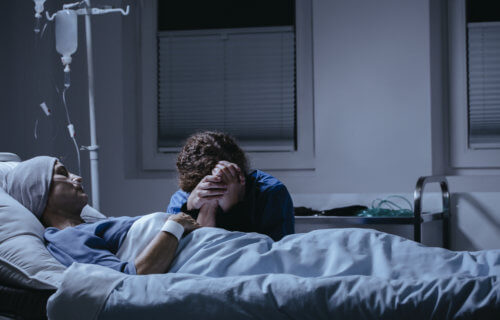STATE COLLEGE, Pa. — Millions of people across the globe have had their lives forever altered after losing a loved one due to COVID-19. It can be a particularly catastrophic experience losing a husband or wife. Now, researchers from Penn State University say that losing a spouse because of COVID may be worse for the surviving partner’s mental health than a death from any other cause.
Researchers say widows who lost a spouse to COVID were more likely to report symptoms of depression and loneliness compared to those whose spouses died before the pandemic. Previous studies show that COVID-19 poses health risks even to those who avoid infection.
“These risks apply to millions of people across the globe who have lost their wives, husbands and partners,” says Ashton Verdery, the Harry and Elissa Sichi Early Career Professor of Sociology, Demography, and Social Data Analytics at Penn State, in a university release.
“Along with evidence that suggests those who experience the highest rates of mental health problems after the death of a spouse also face the largest risks of subsequent physical health problems, our study underscores the potentially significant health ramifications to those losing loved ones to the pandemic.”
Does not having the chance to say goodbye play a role?
Researchers examined data from 27 countries during two separate time periods: before the pandemic, from October 2019 to March 2020, and early in the pandemic, from June to August 2020. The team gathered data on mental health, including from participants who reported feelings of depression, loneliness, and trouble sleeping. Researchers also noted whether participants had recently lost a spouse, when the death occurred, and whether COVID-19 was to blame for the death.
Verdery says COVID-19 deaths were more traumatic due to hospitals restricting access to visitors and social isolation.
“Many deaths during the pandemic likely became more traumatic for their loved ones due to fear of seeking medical care and hospitals restricting friends and family from visiting patients, all which likely made it difficult for people to process deaths regardless of its specific cause,” explains Verdery. “Grieving and mourning were also complicated during the pandemic due to social isolation, along with other stressors such as financial insecurity and lack of practical and emotional support, all of which could further aggravate emotional distress.”
Researchers estimate that 8.8 million people lost close family members to COVID-19 by April 2022. Losing a spouse displayed a link to an increased risk of developing mental health problems as well as declines in physical health. However, Verdery says it’s been unclear whether losing a spouse in a traumatic event poses higher risks than usual.
“Other studies have found that when a person experiences a sudden or traumatic ‘bad death’ — characterized by such factors as greater pain, social isolation and psychological distress — it can be harder on their loved ones, who then go on to face elevated health risks of their own,” notes Verdery. “Given the enormity of the impact of the pandemic, we wanted to see whether this effect applied to those who lost a spouse to COVID-19.”
The study is published in the Journals of Gerontology — Series B.

